This post may contain affiliate links. We may receive a small commission, at no cost to you, if you make a purchase. Read Disclosure.
The title of this article in the Sydney Morning Herald grabbed my clicking attention – No safe level of missing school, study finds.
I dismissed it as soon as it stated the case study was based upon Naplan test results (standardized testing).
It’s the first major study linking poor attendance to lower NAPLAN results.
The consensus is that missing just one day of school has negative consequences for a student’s academic achievement and those who choose to travel with their kids, even if it is for a long weekend, or a short two week jaunt to Paris, are completely screwing up their child’s ability to have a successful and fulfilling life.
Really??
It’s sad that Australian education is heading to the place where NAPLAN testing is the core focus of teaching and the only indicators of a child’s intelligence and potential.
I say the NAPLAN test is every reason to be absent from school.
Relevant learning because of travel
I thought more about that article as we walked around the rim of Kalkani Crater in Outback Queensland.
Millions of years ago, this landscape in Far North Queensland, now called Undara Volcanic National Park, was a tumultuous place, filled with constant volcanic eruptions shaping the land.
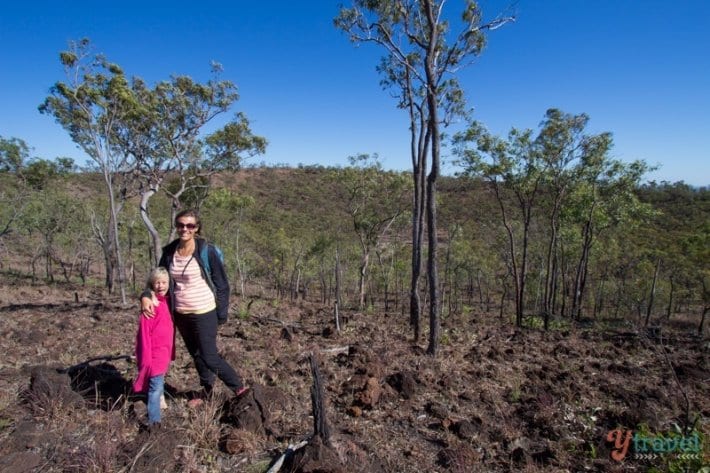
From the crater, we could look out to see volcanic peaks and get a sense of the land that once existed and how these constant volcanic eruptions helped to form the land.
We looked down to the line of dark green rainforest growth depicting the lava tunnels we had walked through the day before.
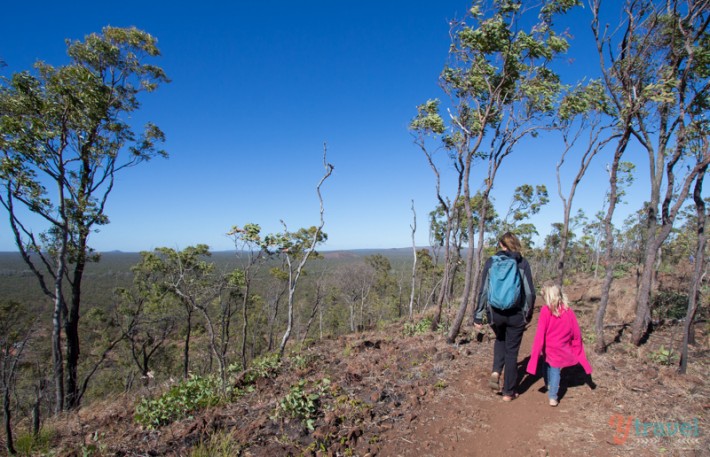
We learned about basalt and granite rock and how the lava flowed to form the tunnels. We heard of how the savannah took over part of the rainforest and why the two habitats can now live beside each other, one not destroying the other.
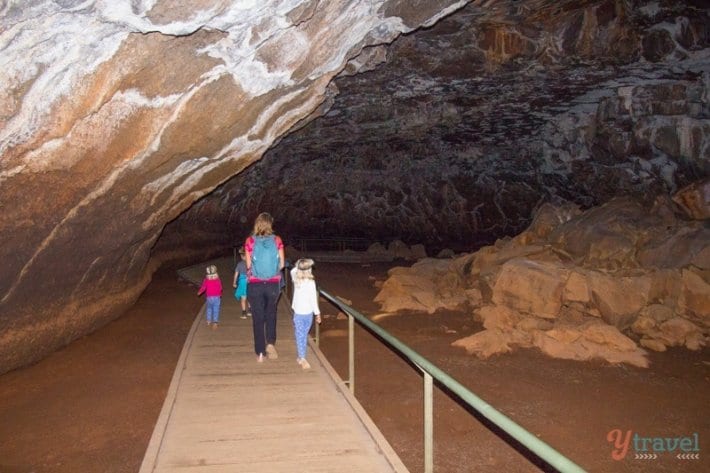
Why did I not know volcano’s existed in Australia?
I’m nearly 40 and have just discovered this. I’ve never heard of lava tunnels before and really had no thorough grasp on how they worked much beyond a huge explosion.
Why didn’t school teach me this? Or perhaps my teacher did, but it was lost on me as I daydreamed out the window trying to find solutions to my problem or dream of that hot boy in the school next door.
Or maybe it was because the class clown needed more attention during that lesson.
Now, here was my six-year-old daughter standing beside me in a lava tunnel learning while she was experiencing (without the hot lava thankfully!). She picked up a basalt rock and in that moment understood that it was formed when the bubbling hot lava cooled down. She won’t ever have to try and remember that fact from a text book.
Apparently, according to the studies this experience was impacting my child’s education in a bad way!
Ha! Who the hell are our educators and those in charge of the research and creating the system?
Apparently “they may be learning a lot about the world but they’re not necessarily learning everything they’d be learning at school.”
Hmm, what are they learning in school then if it’s not about the world? I thought that’s what we all lived in and what we needed to know about in order to, not just survive, but thrive.
What about the life skills to thrive in this world?
Both my daughters have learned an incredible amount on this road trip so far.
More than school will ever teach them and I say that from not only the perspective of a mother, but from my 15 years of Primary School teaching in five countries.
Not only are they learning interesting things about science and social studies, spending time with Aboriginals, snorkeling the Great Barrier Reef, and walking through a 160 million-year-old rainforest, but they are learning the vital life skills that school fails to teach and NAPLAN tests fail to test.
Making a decision, social responsibility, how to get along with strangers, how money works, how to plan and organize and take action. How to overcome fear, how to solve a problem, how to dream big, follow your passions and be yourself.
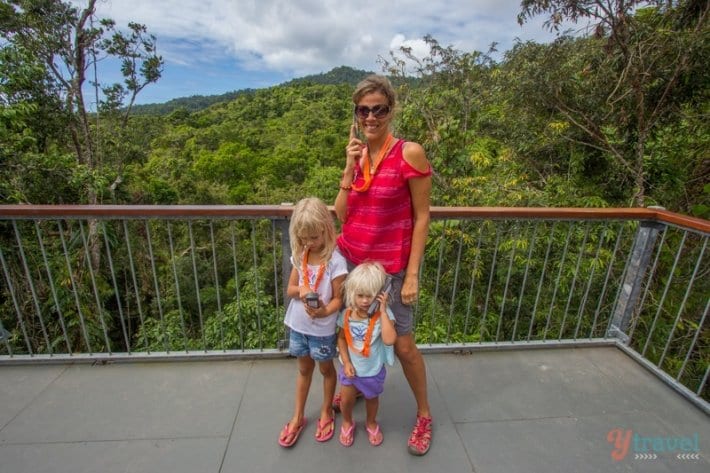
One of the most important things of all – they’re forming an incredible bond with their parents and siblings.
From my experiences as a former teacher, most of the troubled children came from families that were troubled. I’ve witnessed it in schools in Australia, London, Dublin, Bangkok and the USA.
A strong family bond is one of the most important things in a child’s life that will give them the self-confidence and support to overcome any obstacles and to thrive.
The only thing that school does not give my child is long-term friendships, but then I look back at the school system and I think of all the dramas and heartache my students went through because of friendships and bullying, I wonder if she’s really missing out at all.
Connecting with nature
As we were coasting along in a tiny boat through the narrow and exquisitely beautiful Cobbold Gorge on the Gulf of Savannah, our guide, Emma, a sweet gentle lady whose passion for nature ran so deep said,
“I’m so grateful to you parents for bringing your children here today. It’s so important that they come to these places in nature and be one with it to learn more about their land.”
The closer our bond with nature, the healthier our lifestyle.
What classroom teaches you that?

Do they talk about great health choices or how to de-stress through long bush walks, staring at the ocean, or meditation? As far as I know obesity levels, stress and depression is up on the this-is-really-scary levels for children.
I believe if they ran a study on kids who travelled and interacted a lot in nature, these levels would be way down.
In the car as we drove out of Cobbold Gorge, we started Kalyra’s formal lessons as part of her distance education. She had to write a report on the many uses of trees – at last something relevant and interesting where she could showcase what fascinated her and all she had recently learned.
She wrote about the pandanus palm and how wrapping a leaf around your head would take a away a headache. How the sap of the Bloodworth tree is a powerful antiseptic provided by nature. How the tea trees wrap their roots together to keep back the river banks, and how it provided us with paper to write on and soft paper to wipe our bums.
If we never made her absent from school her report probably would have been a few lines of how great trees were to climb up. Pretty important stuff for any child, but the travel part has helped her understand just how much more valuable trees are.
Would this knowledge serve her well in a NAPLAN test? I doubt it would be tested.
The broken system is really broken
The researchers are clutching at straws to try and explain why a broken system isn’t broken and pointing fingers at children who are traveling and not attending school.
So the research shows there’s a correlation between low performance and days absent from school.
Is it showing that some kids are shit at taking tests and crumble at the first question?
Is it showing that some kids just don’t give a shit about tests so they don’t bother to show their capabilities?
Does it show that teachers, due to the intense pressures of a broken system, no longer have the capabilities to educate children properly?
Does it show how the emphasis on standardized testing and letting that guide the curriculum is destroying curiosity and enthusiasm for learning in our kids and how it’s distressing parents who don’t understand, so take the test results as gospel that there is something wrong with their kids?
What are the implications of that by the way?
I know with the formal school work I do with Kalyra on the road she’ll be asked to do many tasks, for example retelling something she’s just read.
It’s usually a book she has no interest in and is a little bored by it. Perhaps it just didn’t rock her world. And she feels she’s done with it and doesn’t want to discuss it. So her retelling is pretty poor. Based on that her teacher could mark her as a low performer and not great at comprehension.
What they don’t know is that three weeks after she watched Frozen she spent an hour walk next to her father retelling the whole story, including word for word dialogue from the characters.
Last week she devoured a chapter book in two hours and then retold the entire story for me. She’s currently reading a Lonely Planet Travel Book that is probably on a fifth-grade reading level (she’s 6). Sure there are words she has difficulty with, but she can sure tell us a few of the amazing facts she’s learning about all the countries of the world.
She knows she doesn’t really want to go to Kakadu National Park because in 2006 a croc snuck into someone’s tent! But Paris holds her fascination and is at the top of her bucket list.
Children learn in different ways.
Children express what they know in different ways.
Some do it well through a test, where they bubble in responses. They’re good at remembering and rote learning and love the satisfaction of achieving high results and getting a gold star.
Other kids enjoy the processes of learning more than the results. They like to showcase the journey – the destination seeming almost pointless, so why bother? Cause many kids are like that. If they don’t see the point, the won’t try.
In fact, many adults are like that – myself included.
The part where I swear
I’m annoyed this “study” has come out and may scare parents away from travelling with their kids and taking some time off school to do it.
Don’t fear the NAPLAN test or any kind of standardized testing. After spending four years teaching to a test in the USA I can see what a scary and dangerous road we’re taking in Australia following this path. I got out of teaching because I couldn’t handle being a part of it anymore and damaging kids.
You know something is broken when, in response to your concerns that the fifth-grade students don’t know their basic multiplication skills, your principal says:
“Don’t worry about that. They can use a calculator in the EOG (End of Grade Test) so you don’t have to spend any more time on it.”
What the FUCK is that about? Excuse my French, but that should have the highly emotive force of a cuss word behind it.
I wasted hours of valuable time teaching my children how to colour so the pencil stayed in the bubble AND how to use the process of elimination to narrow down the four answers to two. That made the odds of guessing right better because they usually give you two silly answers.
I KID you NOT!! IT’s freakin catastrophic.
That’s what these stupid tests do.
I’m in no hurry to send my child back to school. I think she’s far smarter with out it. I think she’s been granted the gift of space to love learning to embrace her curiosities to follow her own passions, to not waste time learning crap that bores her and she’ll never use again once she leaves school.
I’m so glad I spent hundreds of hours learning algebra and calculus during Maths class because since I finished my final Year 12 maths exam, I’ve used it for… I’ve used it for….. NOTHING.
Everything I have learned to help me live a happy and fulfilled life has come from the lessons and experiences I’ve had travelling. Except for reading, basic maths, and writing, which I grant school helped me out with to a certain extent.
What would you rather, a child that’s good at regurgitating information to pass a test, or one that can create and innovate based upon their passions and talents?
Who are the better inheritors of the earth?
Those kids given the opportunity to interact with their world, to learn about nature and survival, to learn how others think and solve problems, to investigate cause and effect with their own hands, to socialise with people from many parts of the world, to think creatively, to help their parents solve the problems when they run out of fuel, or take a wrong turn, or can start a fire, and grow a veggie garden, raise cattle, and help other diplomatically resolve disputes with the ability to see and understand all sides.
These are the kids that might fail a stupid test but will win at the game of life.
Some of the most successful and richest people on the planet never finished high school or went to college.
If you are going to take your kids out of school to travel do this
Some of those findings could be a true reality – absentee kids’ education could well be affected.
But delve deeper into the stories behind it before making blanket statements.
Perhaps there are learning difficulties already there. Perhaps their parents don’t take the time to do some work because if you do take your kids out of school there is some work you’ve still got to do.
Read more – Homeschooling & Distance Education: the GOOD and the BAD
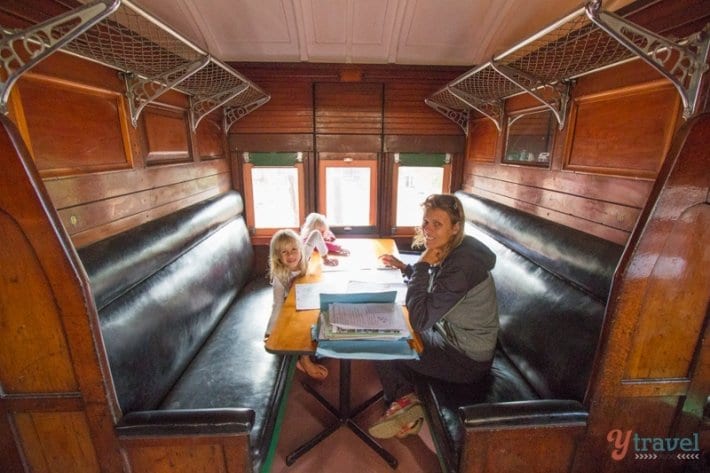
But I reckon these stats would be low.
They will learn so much from interacting from the world around them, but you do have to keep the skills up.
Reading and basic maths and writing is essential. You cannot take a holiday from them, but it’s so easy to incorporate that and I find kids will pick up the skills far easier because its one-on-one learning and far less distractions than you will find in a classroom.
Schools do have a purpose and are important for helping kids learn, but a revolution is needed to make it more relevant to life!
Standardized testing should be nuked!
I’m currently putting together an eBook of a series of articles I wrote about life learning. Within will have lots of amazing tips for helping children learn – with love and passion, outside the school walls.
After reading this article, I feel like I need to get that finished and out there to help parents who might feel a little overwhelmed by the school system and these stupid tests and might need some help to take on some of the responsibility themselves.
All good education starts from the home.
Parents are the foremost educators for their children, they cannot pass that torch over to the school system because its broken and teachers are stretched to the max.
I love and adore teachers, I know the hell they go through, and I know that at the core of what they do they just want to help children learn and love it.
Their job is getting more and more difficult due to the powers above who don’t have a clue. Sadly more of our quality teachers are running for an alternative path, or taking time out on stress leave.
Simple tips to get you started:
- I’m not sure these tests are going away. Let your children know that it’s important they do their best, but it’s not the be all and end all. They are amazingly talented and intelligent beings who have something very special to offer the world and often tests and schools don’t know how to recognize that.
- Read to your child every single night from birth. I don’t care how busy you are. We’re all busy. You just need to do ten minutes a night. It’s a beautiful bonding experience and will help them in more ways than anything else. I know that Kalyra picked up reading very quickly because of this ten minute a night groundwork – it really is that powerful.
- Incorporate basic maths in your everyday life and discussions. Let them help you with shopping, let them touch money and hand it over and count the change. Let them measure out the ingredients when you cook.
- Allow them to pursue their passions. If they’re super talented at soccer, let them join a team. If they’re passionate about the guitar, get them lessons, sign them up for acting classes, allow them to dance. Skip homework if you have to, the passions are more important (Don’t get me started on the homework rant!)
- Travel as often as you can. Even if it’s a weekend getaway to explore new regions in your home town. And take days of school to do it if you need to. Hell, take a whole month off. You won’t regret it and the development of your child’s whole self will be amazing – that’s the true purpose of education.
What do you think?
Do you think NAPLAN and standardized tests are a good thing?
Does missing just one day, one week, or even one year of school to travel impact your child’s education in a BAD way?